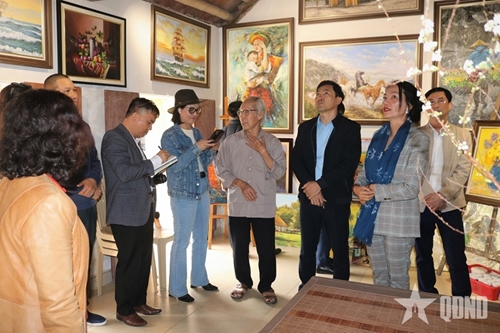Sitting in ancient wooden Quan Anh Heritage House, Executive Director of Ecohost Bui Thi Nhan recalled the journey of establishing the Ecohost model, starting in 2018. With many years of experience in the tourism industry and frequent contact with international travelers, she gradually recognized the inherent limitations of accommodation services in rural areas which are rich in culture but lack professionalism in tourism operations. Ecohost was born with a hope of creating a high-quality homestay model that could help the local community both preserve their cultural identity and better meet visitors’ expectations.
    |
 |
|
Visitors explore and experience at Hai Minh artists’ village. |
However, the path to turning that dream into reality was not easy. “The villagers wondered if any tourists would actually come. The authorities did not believe Hai Hau could develop tourism,” Nhan recalled. To change their mindset, they had to go to the villages, working alongside locals to clean the environment, plant flowers and ornamental trees, build sample models, bring the first groups of tourists, and gradually convince the community with tangible results. “They had to see it with their own eyes, hold the money in their own hands to believe it. Slowly but surely, many have become pro-active, even creating additional services themselves,” Nhan added.
Ecohost is more than just a place to stay. With the insight of seasoned tourism professionals, local people understand that tourism products only become truly appealing when tied to local culture. From this perspective, the model connected numerous craft villages and unique destinations in Hai Anh to create tours that explore rural life.
At the heart of the Ecohost ecosystem is Quan Anh Heritage House which is over 100 years old, blending European and traditional Northern Vietnamese architecture. The house serves as a lively cultural space, hosting performances, storytelling sessions about land reclamation history and wet rice culture, and acting as a starting point for heritage tours.
From this heritage house, visitors can experience a range of activities tied to local culture, such as cycling through scenic countryside landscapes, immersing themselves in the living spaces and diligent work of villagers, visiting national cultural-historical relic of Ngoi Bridge - Luong Pagoda, learning about the art of crafting brass instruments in Pham Phao village, listening to stories and painting at Hai Minh artists’ village, or exploring the traditional silk-reeling and weaving craft of Co Chat village. Each destination tells its own story, offering authentic emotions and avoiding the monotony and mass-market feel of conventional tourism.
To gain these aforementioned achievements, Nhan explained that there must be the collective effort of three parties with villagers as the main pillar, authorities as legal framework provider, and businesses as connectors and promoters. This tripartite partnership has enabled Ecohost to operate effectively and sustainably.
Visitors leave happy, recommend the experience to friends, and return. This is true sustainability. Beyond increasing local income, Ecohost model has gradually changed the community’s mindset. Local residents have become proud of their culture, taking better care of village roads. Local authorities have also begun to accompany the efforts with a clearer long-term vision.
The model has been multiplied in many other localities, with former collaborators now independently running new destinations. They not only continue the model but also inspire other communities to join in to preserve the soul of their countryside. For tourists, Hai Anh is no longer just a stopover but a place to slow down, live green, and live amidst cultural stories told with heartfelt sincerity by local people.
Translated by Song Anh